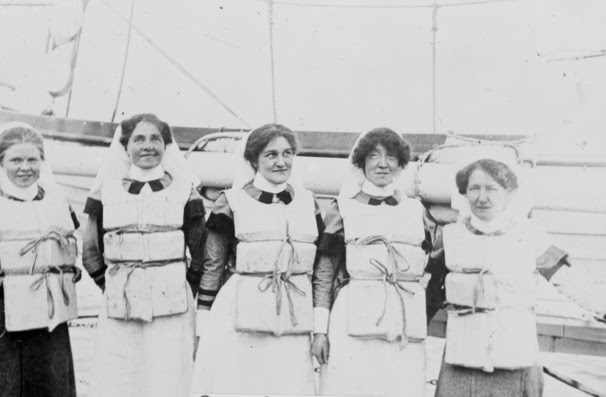*****
His Majesty’s Hospital Ship ‘MAURETANIA’
War Diary, 10th October 1915 to February 29th 1916
The National Archives, WO95/4146
1915
10th October: In accordance with War Office instructions proceeded to Liverpool to arrange details as regards the fitting up of the R.M.S.S. “Mauretania” as a Hospital Carrier. Arrived Liverpool 6.30 p.m. Visited ship and after, P.N.T.O.
11th October: Inspected ship with Commander Currie R.N., arranged such matters as bulkheads, lavatory accommodation etc., etc. Indented for Ordnance Stores, Clothing, Stationary, Red X Stores.
12th to 20th October: Work in the ship. Arrival of Stores.
21st October: Detachment arrived, also a portion of the staff of No.27 General Hospital. Stores embarked. Officers addressed on their respective duties.
22nd October: Anchored in Mersey and sailed at 7 p.m. Weather – thick.
23rd October: Off Scilly 12 noon. Weather – clear.
24th October: Off Lisbon. Weather – clear.
25th October: Passed Gibraltar. Weather – clear.
26th October: At Sea
27th October: At Sea
28th October: At Naples. Coaled.
29th October: Left Naples.
31st October: Arrived Mudros.
1st November: Coaling.
2nd November: Embarked wounded from H.S. “Galeka” and H.S. “Delta”.
3rd November: Embarked wounded from shore hospital.
4th November: Embarked wounded from shore hospital. Pte. T. Calderbank, 1/5 Manchester Regt., died. Left Mudros 4 p.m.
5th November: No.3765 Pte. Parker F., 3rd Field Ambulance, R.N.D., died and was buried at sea. Pte. Lee operated on for appendicitis.
6th November: At Sea.
7th November: At Sea. Pte. Lee, 9th W. Yorks died of Enteric with perforation. P.M. showed gangrene of the bowel. Pte. Marchant, 5th R. Fusiliers died of Dysentery.
8th November: Off Gibraltar 7.35 a.m. Received signal (Wireless) asking accommodation for convalescents. Replied 19 Officers and 81 other ranks. Message received at 7.45, replied 7.52 a.m. Wireless instrument broke down. Message reported delivered at 8.15 a.m. Ship’s fireman Bowen died at --- of Dysentery and pneumonia.
9th November: At Sea.
10th November: Docked at 1.45, Southampton.
11th November: Ship commenced re-fitting.
12th to 22nd November: Ship in dock. Improvements are almost completed the chief of which have been (1) Gutting E Deck and erection of Double Tier berths. (2) Gutting C & D Aft, Double Tier berths. (3) Officers dining saloon to C1 and old dining room converted into a ward for 51 swing cots. (4) Altering aseptic theatre. (5) Altering men’s dining room and fitting of antiseptic tank and washstands. (6) Various sanitary improvements. (7) Additions to disinfector and increase of laundry machinery. (8) Erection of Sisters’ Duty Rooms.
23rd November: Left Southampton with R.A.M.C. details and nurses.
24th November: At Sea.
25th to 27th November: At Sea.
28th November: Arrived Naples.
29th November: Visited British Consul General at Naples. Ship inspected by Consuls of U.S. America, Denmark, Switzerland (representing Germany) accompanied by British Consul General. Statement in writing given me signed by 4 Consuls, that this ship has no combatant troops or war-like stores on board and that the rules of the Geneva Convention are being strictly carried out. Left Naples.
3rd December: Arrived Mudros – Embarked sick from H.S. “Devana”, H.S. “Nevassa”, H.S. “Delta”, H.S. “Soudan” and shore hospital.
4th December: Left Mudros. No.10369 Pte. Poole H., died of Dysentery yesterday 1 hour after embarkation and was buried at sea today. (8th Cheshire Regt.)
5th and 6th December: At Sea.
7th December: Arrived Naples for coal and water. Visited British Consul General at 10 a.m.
8th December: Pte. J. Cuddy, Lancs. Fus., died at 1.45 a.m., from Dysentery. Left Naples at 7.30 a.m. Inspection 10 a.m. with Sanitary Officer and Medical Director General of Cunard S. S. Line. Several matters connected with Sanitary improvements enquired into and a list of these prepared for authorities at port of disembarkation.
9th December: At Sea.
10th December: At Sea. Passed Gibraltar 8 p.m. Entered bay and stopped – Naval officers boarded vessel and brought papers appertaining to number of sick on board for signature. Proceeded at 9.10 p.m. westwards.
11th December: No.1849 Pte. Foot, 1/8 Hampshires died and was buried at 4.35 p.m. – Acute Dysentery. N.W. Wind – ship rolling. No.34552 Gr. J. Drawfield R.F.A. developed Tetanus and was isolated.
14th to 16th December: Arrived Southampton 7 a.m. Invalids disembarked at 9 a.m. In Southampton.
23rd December: Staff Nurse Miss Stanley died in Netley Hospital of Dysentery.
1916
8th January: Complaints re Sgts Mess. Reported to Ship’s Officials.
9th and 10th January: At Sea.
11th January: At Sea. Communicated with Master re linen of R.A.M.C.
12th January: Naples 7 a.m. Left at 10.15 p.m.
13th January: At Sea.
14th January: Arrived Mudros 4.45 p.m. Visited “Aragon”. No ships ready to transfer patients. S.E. breeze freshening.
15th January: Strong breeze from S.E. Ship moved to new anchorage 8 a.m.
16th January: At Mudros. Loading patients from Hospital Ships “Morea”, “Panama”, “Gloucester Castle”, & “Essequibo”.
17th January: Loading continued. Left Mudros at 4 p.m.
18th January: At Sea.
19th January: Naples 4.30 p.m. Nominal Rolls sent to 3rd Echelon, Alexandria. Cable to D.D.M.S. Southampton.
20th January: Coaling and taking in water at Naples.
25th January: Arrived Southampton.
9th February: Left Southampton. Anchored in Solent.
9th to 23rd February: In Solent. At 4 p.m. the Officers, Nursing Sisters and Detachment disembarked at Southampton.
24th February: 8.30 a.m. Ship proceeded to Liverpool.
25th February: Arrived Liverpool.
29th February: Ship being no longer required I handed over charge.
F. J. Brown
Lieut. Colonel, R.A.M.C.
O. C. Troops, H.M.H.S. “MAURETANIA”




